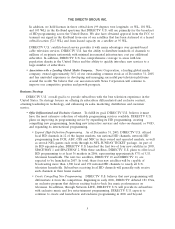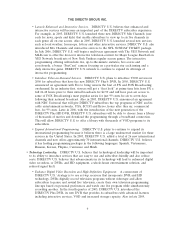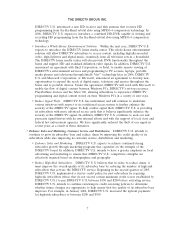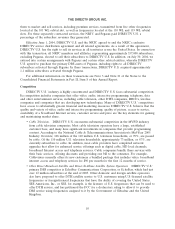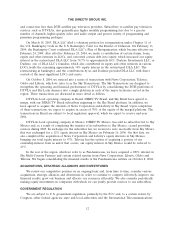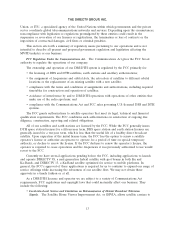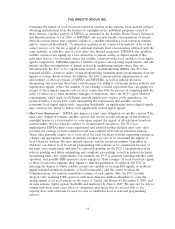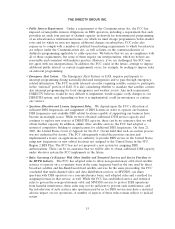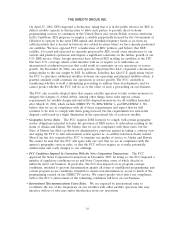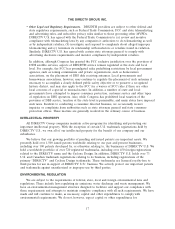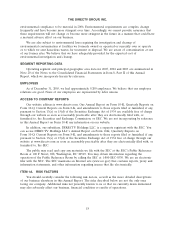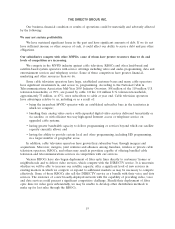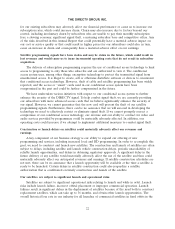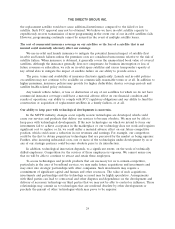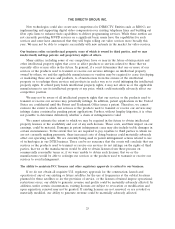DIRECTV 2005 Annual Report Download - page 28
Download and view the complete annual report
Please find page 28 of the 2005 DIRECTV annual report below. You can navigate through the pages in the report by either clicking on the pages listed below, or by using the keyword search tool below to find specific information within the annual report.THE DIRECTV GROUP, INC.
•Public Interest Requirement. Under a requirement of the Communications Act, the FCC has
imposed certain public interest obligations on DBS operators, including a requirement that such
providers set aside four percent of channel capacity exclusively for noncommercial programming
of an educational or informational nature, for which we must charge programmers below-market
rates and for which we may not impose additional charges on subscribers. FCC rules also
require us to comply with a number of political broadcasting requirements to which broadcasters
are subject under the Communications Act, as well as limits on the commercialization of
children’s programming applicable to cable operators. We believe that we are in compliance with
all of these requirements, but some of them require our interpretations, which we believe are
reasonable and consistent with industry practice. However, if we are challenged, the FCC may
not agree with our interpretations. In addition, the FCC could, in the future, attempt to impose
additional public interest or content requirements on us, for example, by seeking to impose rules
on indecent programming.
•Emergency Alert System. The Emergency Alert System, or EAS, requires participants to
interrupt programming during nationally-declared emergencies and to pass through emergency-
related information. The FCC recently released an order requiring satellite carriers to participate
in the ‘‘national’’ portion of EAS. It is also considering whether to mandate that satellite carriers
also interrupt programming for local emergencies and weather events. Any such requirement,
DIRECTV believes, would be very difficult to implement, would require costly changes to our
DBS/DTH system, and, depending on how it is implemented, could inconvenience or confuse
our viewers.
•Spectrum Allocation and License Assignment Rules. We depend upon the FCC’s allocation of
sufficient DBS frequencies and assignment of DBS licenses in order to operate our business.
DBS frequencies and available DBS orbital locations capable of supporting our business have
become increasingly scarce. While we have obtained additional DTH service capacity and
continue to explore new sources of DBS/DTH capacity, there can be no assurance that we will
obtain further capacity. In addition, unlike other satellite services, the FCC had adopted a
system of competitive bidding to assign licenses for additional DBS frequencies. On June 21,
2005, the United States Court of Appeals for the D.C. Circuit held that such an auction process
was not authorized by statute. The FCC subsequently voided the previous auction and
implemented a freeze on applications for authority to provide DBS service in the United States
using new frequencies or new orbital locations not assigned to the United States in the ITU
Region 2 BSS Plan. The FCC has not yet proposed a new system for assigning DBS
authorizations. There can be no assurance that we will be able to obtain additional DBS capacity
under whatever system the FCC implements in the future.
•Rules Governing Co-Existence With Other Satellite and Terrestrial Services and Service Providers in
the MVPD Industry. The FCC has adopted rules to allow non-geostationary orbit fixed satellite
services to operate on a co-primary basis in the same frequency band as the one used by direct
broadcast satellite and Ku-Band-based fixed satellite services. In the same proceeding, the FCC
concluded that multi-channel video and data distribution services, or MVDDS, can share
spectrum with DBS operators on a non-interference basis, and adopted rules and a method for
assigning licenses in that service, as well. While the FCC has established service and technical
rules to govern the non-geostationary orbit and MVDDS services to protect DBS operations
from harmful interference, these rules may not be sufficient to prevent such interference, and
the introduction of such services into spectrum used by us for DBS service may have a material
adverse impact on our operations. A number of aspects of these rules remain subject to judicial
review.
15


